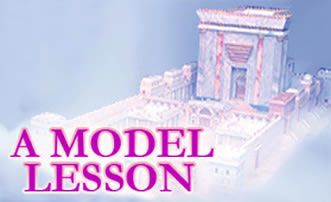
What You See Is What You Get
Yet what was so terrible about not understanding the Divine command? Don't we all sometimes make mistakes? Why should the entire Jewish People have had...

On the 17th of Tammuz we enter into the saddest period of the Jewish calendar – the Three Weeks of mourning that culminate in the fast day that commemorates the destruction of the First and Second Temples – Tisha B’Av.
The 17th of Tammuz is itself a fast day, since this is when the walls of Jerusalem were first breached. It is also a day of self-reflection because, as our Sages say, in any generation where the Temple is not rebuilt, it is as if the Temple was destroyed in that generation.
To understand how we might be responsible today for the delay in rebuilding the Temple, and learn what we can do to hasten its rebuilding, it is helpful to go back to the incident where the troubles began: the bad report of the Land of Israel given by the 12 spies, which can be found in B’Midbar (Numbers), Chapter 13.
Error Message!
According to the great 19th century sage Rabbi Meir Leib ben Yechiel Michael, who is known as the Malbim, there was an error in comprehension from the very start of the mission. When God tells Moshe (Moses) to “Send out men for you” to go into the Land of Israel, the Hebrew verb T-U-R is used and not R-G-L.
T-U-R means to tour or to explore. R-G-L means to spy. What’s the difference?
God was telling Moshe that the mission of the 12 men was to explore the Land of Israel so that they could determine where to build their cities and where to establish their farms. How they were going to conquer the land was not an issue for them to worry about, because God had already promised them that the land would be theirs. Their one and only job was to determine where within the land they wanted to establish their dwelling places.
The act of spying, on the other hand, has a very different purpose. Countries send out spies to try to get a hold of another country’s military secrets because they fear that without this information they will be at a disadvantage should a conflict arise. Although spies are used to bolster a country’s security, the need for them implies a lack of security.
Since the Children of Israel already had a sure-fire advantage over the inhabitants of the Land of Israel – namely God’s guarantee that they would be successful in the conquest – there was no need to send “spies.” Therefore, when the 12 men chosen for the task of going to the Land of Israel changed their assignment from one of exploration to one of spying, they displayed a deep lack of comprehension of what was expected of them.
Yet what was so terrible about not understanding the Divine command? Don’t we all sometimes make mistakes? Why should the entire Jewish People have had to endure 2,000 years of exile because of one mistake made by 12 men?
The answer to this question must lie within the nature of the mistake itself. As we know, there is a difference between an intentional transgression and an unintentional one – and the punishment differs for outright rebellion and mistakes that are made because we lack the knowledge to know the difference between what is right and what is wrong in God’s eyes.
However, there is also another type of transgression – one that lies within the gray area that separates knowing intention from unconscious action. When we are guilty of this type of transgression, we have mistakenly convinced ourselves that a wrong action is really something that is God’s will. We have allowed intentional rationalization to lead us into unintentional rebellion.
What sort of transgression did the spies commit? To find out, we must take a look at the events that led up to their mission.
Secret Agents or Agents of Secrets?
The Ohr HaChaim, Rabbi Chaim ben Atar (18th century kabbalist and sage), sheds an interesting light on the incident of the 12 spies. He points out that when a person represents someone else he becomes affected by that other person’s thoughts and values.
A salesperson, for instance, is an agent for a company. To be successful, the salesperson must believe that the company’s products are beneficial. If the product really is beneficial – well and good. But what if the product is actually harmful to the health, or what if the company is involved in a scam operation that is bilking innocent people of their money? If the agent badly needs the job, she will have to internalize the skewed values of the company and with time she may not even be able to see that she is doing anything wrong.
When the Children of Israel left Egypt, a group of people known as the “Mixed Multitude” left with them. This mixed multitude was on a very low level spiritually. For them, the events of the Exodus were not pathways to spiritual growth that would lead them closer to God, they were just a “way-out” of a bad situation. At the first moment of difficulty in the desert – which they interpreted as being just another bad situation that needed to gotten out of, and not as an opportunity to develop emunah (faith) and bitachon (trust in God) – they began to complain.
“We’re thirsty! We want water! We’re hungry! We want meat and melons and onions and garlic!”
And if the service provided by God, via His servants Moshe and Aharon (Aaron), wasn’t fast enough, this mixed multitude had a ready answer:
“Let’s go back to Egypt! Now!”
The lack of emunah and the constant grumbling of these malcontents had a very demoralizing impact on the rest of the people – including the men who were sent to explore the Land of Israel.
Although the 12 men selected for the mission were of the highest caliber, only two of them – Yehoshua (Joshua) and Caleb – were wholehearted. The other ten men carried within their hearts the doubts and fears of the mixed multitude and by the time they got to the Land of Israel, the whispers of doubt had turned into a thunderous roar.
What Fear Can Do
God had told the people that the land He was giving them was a land filled with bounty and blessing. However, when the spies arrived in the land they thought they were seeing a land of destruction and bizarre phenomena.
The fruit growing there was so big that it took two grown men to carry a cluster of grapes. Wherever they turned, they saw the inhabitants of the land weeping and wailing as they went to bury their dead. Very strange, indeed.
If the spies had planted the words of God’s promise firmly in their hearts, they would have been able to correctly interpret what they were seeing.
“Wow! Look at how big that cluster of grapes is! This land really is a land of bounty”.
“See how God is protecting us so we can accomplish our mission. He has arranged things so that the land’s inhabitants will be so busy burying their dead that they won’t notice us! This really is a land where we will be protected by His blessing.”
What happened instead, as we know from the spies’ report that is recorded in the Torah, is that they gave more credence to the fears of the mixed multitude than the promise of God.
“These gigantic fruits are unnatural! There must be something perverse about this land,” they said.
“This is a land that eats its inhabitants. Everywhere we went, we say nothing but death and mourning.”
The spies did not set out with the intention of ignoring God’s words, and so the transgression they made when they defamed the Land of Israel through their erroneous report was not an intentional rebellion. Yet because they were all righteous and learned men, their transgression could not be called purely unintentional. They knew that the people who were filled with fears and doubts were on a much lower spiritual rung, and yet they still allowed themselves to be guided by their poor attitude.
The consequence was that their interpretation of events was tragically flawed. Instead of trying to fit what they observed into the framework of “bounty and blessing,” they interpreted everything they experienced in a negative way. And the only way they could rationalize this skewed version of reality was to leave God out of the picture.
When they returned to the Israelite camp, they did concede that the land flowed with milk and honey. However, they went on to say that, “We are not able to go up against the people; for they are stronger than we are.”
Without God, their evaluation of the security situation was perhaps 100 percent accurate. But this crucial omission rendered their opinions 100 percent worthless.
Unfortunately, the ten spies succeeded in convincing the rest of the people that only death and destruction awaited them in the “good” land that God had promised them. The battle cry of what had previously been the fringe – “Let’s go back to Egypt” – was now the rallying cry of the many.
It was only Moshe’s passionate plea that saved the people from being destroyed by God’s wrath. Yet even though God did forgive the people, what had been done could not be undone. The people cried all night and engaged in sincere repentance, but God did not rescind His decree: that generation was condemned to die off in the wilderness and it was their children who inherited the land.
When “I’m Sorry” Is Not Enough
Some of the people could not accept that saying “I’m sorry” was not enough to change the decree. The next morning they organized their own army and set off to conquer the land. They were immediately defeated.
Why wasn’t their teshuva (repentance) accepted?
Sometimes opportunities come along that are only offered once, or only offered in a specific time frame. This happens all the time in the business world, where the opportunity to get in on the ground floor of the next hot investment is only offered for a short period of time. It also happens in a woman’s life, where her ability to have children is controlled by her biological clock.
The Children of Israel had been given several opportunities to show that they were spiritually ready to enter into the Land of Israel – and each time they failed. Because a part of their hearts was still enslaved by Egyptian culture and values, they were unable to muster up the bitachon (trust in God) that was a prerequisite for settling the Land.
Saying “I’m sorry” averted the decree of death, but it could not change the fact that they had denied God’s providence over the world. Because they had doubted God’s ability to safely bring them into the Land of Israel, there had been a limiting of God’s glory in the world.
For that offense there was not – and still isn’t – an erasing of the transgression that leads to complete forgiveness.
A Night of Crying – and Laughing
The night that the ten spies delivered their evil report was the night of Tisha B’Av. Because the people cried for no reason – they could have listened to the good report given by Yehoshua and Caleb instead – God decreed that this night should be a night of crying for the generations. And, indeed, the two Temples were destroyed on this night.
Yet within the tears there is hope, for we know that soon the Temple will be rebuilt. How can we do our part to hasten its construction and usher in an era of world peace?
First, we must understand that our job is not to spy out God’s world. Everything we need to know about living a good life – a life that is filled with bounty and blessing – is contained in God’s Torah. Yes, we are commanded to “explore” the Torah – to study it and internalize its teachings so that we can live by it. But we should never think that God isn’t wise enough to know what’s best for us or strong enough to protect us from harm – or fear that He has left us alone in the world to fend for ourselves.
Second, we have to recognize that there is a “mixed multitude” residing within all of us. These are the worries and fears that prevent us from opening up to God’s kindness and protection. If we allow our lives to be dominated by worry, we will have what to worry about, because the Talmud promises us that, “A person is led along the path that he chooses to travel upon.” If, however, we truly believe in God’s promise that the Land – and all of life – is bountiful and full of blessing, we will become agents for bringing this bounty and blessing into the world.
Third, we have to realize that our actions do have consequences. Every day that we disregard the mitzvot (commandments) of the Torah is another day when God’s glory is diminished in His creation. Every time that we diminish other people through gossip or treat Shabbat with disrespect, we are diminishing the amount of holy light that can shine into the world – and delaying the rebuilding of the Temple for one more day.
However, because we are told that Tisha B’Av will one day become a day of laughter and celebration, we know that we are not condemned to repeat the error of the ten spies and the Children of Israel. We can merit to rebuild the Temple – and by resolving to follow God’s Torah with a joyous and whole heart, we can start rebuilding it today.
May the fasting and prayers and meditations that we offer to God on the 17th of Tamuz be accepted, and may we merit to see the rebuilding of the Temple now and at once.
***
Libi Astaire is the author of Choose Light! Chassidic Tales for Chanukah, Rosh Hashanah, Sukkos, Passover & Shavuos; Breakfast with Rav Zusha and Other Stories to Wake Up Your Soul; and the award-winning Jewish Regency Mystery Series. Visit her website for more information about these and other books.












Tell us what you think!
Thank you for your comment!
It will be published after approval by the Editor.